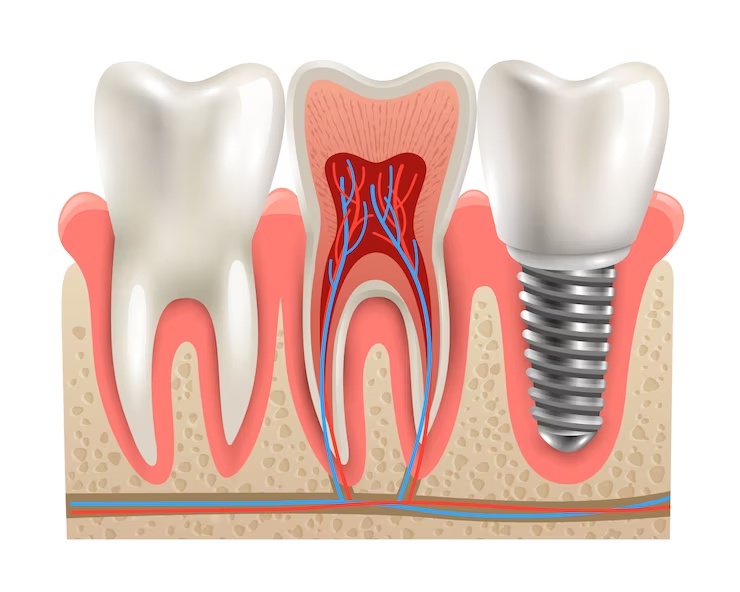Summary: To help you better understand these dental procedures, we've compiled a list of frequently asked questions (FAQs) to address common concerns and provide essential information.
Dental procedures such as implants, crowns, and root canals are common treatments that can significantly improve your oral health and restore your smile.
Dental implants Woodbridge VA FAQs
-
What is a dental implant?
A dental implant is a titanium post surgically placed in the jawbone to replace a missing tooth root. It provides a stable foundation for a dental crown or bridge.
-
Who is a candidate for dental implants?
Most individuals with good oral and overall health are suitable for dental implants. Adequate bone density and healthy gums are essential for a successful implant.
-
Is the dental implant procedure painful?
The implant procedure is typically performed under local anesthesia, and many patients report minimal discomfort. Post-operative pain is manageable with over-the-counter pain relievers.
-
How long does it take to complete the dental implant process?
The entire process can take several months, including the implant's healing in the jawbone. However, the time frame can vary based on individual cases.
-
Are dental implants permanent?
Dental implants are designed to be a long-term solution. With proper care and maintenance, they can last a lifetime.
-
Do dental implants look and feel natural?
Yes, dental implants closely resemble natural teeth in both appearance and function. They offer a stable and natural-looking solution for missing teeth.
-
What is the cost of dental implants?
The cost varies depending on the number of implants needed, the location, and any additional procedures. On average, a single implant can range from $3,000 to $4,500.
Dental crowns in Woodbridge VA FAQs
-
What is a dental crown?
A dental crown is a cap placed over a damaged or weakened tooth to restore its shape, strength, and appearance. It's often used for teeth with large fillings, root canals, or significant damage.
-
Are dental crowns noticeable?
Modern dental crowns are designed to match the color and shape of your natural teeth, making them virtually indistinguishable from your real teeth.
-
How long do dental crowns last?
The lifespan of a dental crown can vary, but it typically last 10 to 15 years or longer with proper care and maintenance.
-
Is the dental crown procedure painful?
The procedure is usually done under local anesthesia, making it relatively painless. Patients may experience some mild discomfort afterward, but this is manageable with over-the-counter pain relievers.
-
How are dental crowns cared for?
Dental crowns require regular oral hygiene practices like brushing, flossing, and routine dental check-ups. Avoiding chewing hard objects can also extend their lifespan.
-
Can a dental crown fall off?
While rare, dental crowns can become loose or fall off. If this happens, you must see your dentist promptly for re-cementing or replacement.
Root canal Woodbridge VA FAQs
-
What is a root canal?
A root canal is a dental procedure to remove infected or damaged pulp from a tooth. It helps save the tooth and prevent the spread of infection.
-
Is a root canal painful?
Root canals are performed under local anesthesia, so patients should not experience pain during the procedure. Some post-operative discomfort is joint but can be managed with pain relievers.
-
How do I know if I need a root canal?
Common signs include severe tooth pain, sensitivity to hot and cold, swelling, and abscesses. A dentist will diagnose the need for a root canal through examination and X-rays.
-
Is there an alternative to a root canal?
In some cases, extraction may be an alternative, but preserving the natural tooth with a root canal is often the preferred option as it maintains oral function and aesthetics.
-
Are root canals successful?
Root canals have a high success rate. Most treated teeth can function effectively for the rest of your life.
-
How long does a root canal take?
The length of a root canal procedure can vary depending on the tooth's location and complexity. It may take one or more visits to complete the process.
-
Do root canals weaken teeth?
Root canals remove the infected pulp but leave the tooth intact. However, a crown is often recommended after a root canal to strengthen and protect the tooth.
-
Is sedation available for root canal procedures?
Yes, dental sedation options, such as oral sedatives or nitrous oxide, are available to help patients relax during a root canal.
-
Are dental implants safe for older adults?
Dental implants are a safe and effective solution for older adults as long as they have good overall health. Age alone is not a limiting factor.
-
What are the advantages of dental implants over dentures?
Dental implants offer better stability, comfort, and natural functionality than removable dentures. They also help preserve bone density in the jaw.
-
Can I get dental implants if I smoke or have a chronic illness?
While smoking and certain chronic illnesses can slightly increase the risk of complications, dental implants are still possible with proper evaluation and care. Consult with your dentist for guidance.
-
Can dental crowns be used to improve the appearance of healthy teeth?
Yes, dental crowns can be used for cosmetic purposes to enhance teeth' shape, size, and color, even if they are healthy.
-
How are dental crowns different from veneers?
Dental crowns cover the entire tooth, while veneers are thin shells covering only the front surface. Crowns are typically used for more extensive repairs.
Dental implants, crowns, and root canals are valuable dental procedures that can address various oral health issues. If you have further questions or concerns about these treatments, it's essential to consult with a qualified dentist or oral surgeon for personalized guidance and care. Remember that maintaining good oral hygiene practices is key to the long-term success of these dental procedures.


No comments yet